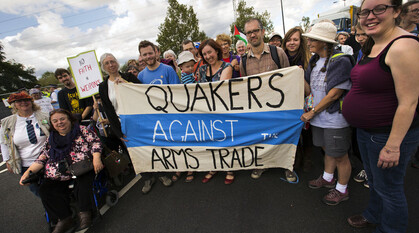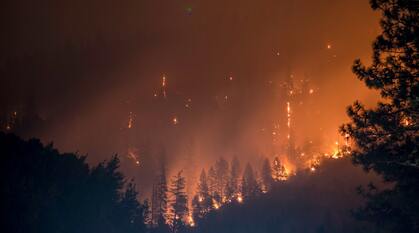Tackling the climate emergency: what can councils do?
In less than a year more than half the UK's local authorities have declared a 'climate emergency'. Livvy Hanks outlines 7 things your council can do to make a difference.

An immense shift is taking place. In less than a year more than half the UK's local authorities have declared a 'climate emergency'.
It was Carla Denyer, a Quaker and a Green Party councillor on Bristol City Council, who proposed the UK's first climate emergency motion in November 2018, inspiring a wave of similar motions up and down the country. During the debates, councillors have spoken of the local benefits of tackling the climate crisis, including cleaner air, warmer houses and improved public transport.
But what does a council do, once it has publicly acknowledged this existential threat and vowed to set itself to tackling it? What, in reality, can it do? Here are some ideas:
1. Transform transport infrastructure
In Nottingham, the introduction of a workplace parking levy in 2012 has helped increase public transport use and reduce carbon emissions. Revenue from the charge is ring-fenced for public transport improvements.
Glasgow is piloting school streets. These are car-free zones outside schools at the beginning and end of the school day, to improve safety and air quality by encouraging walking and cycling to school.
Councils can also invest in cycle infrastructure, support cargo bike deliveries, insist on stricter emissions standards for buses and taxis, and stop building new roads.
2. Improve housing energy efficiency standards
Stroud District Council is a leader in this area, having installed air source heat pumps and solar panels in many council houses, supported retrofitting programmes, and commissioned research into renewable energy capacity in the area. Norwich City Council, meanwhile, has won an award for its new council homes built to Passivhaus standard and launched a framework to help other local authorities find contractors with the skills to design and develop energy efficient buildings.
Councils can also insist that all new housing developments of more than 10 dwellings get a certain proportion of their energy from renewable sources. This is known as the 'Merton rule', after Merton Council, which introduced a 10% requirement in 2003. The growth of renewable energy since then means this is now an extremely unambitious and inadequate requirement – but hardly any councils have chosen to increase it.
3. Use land more sustainably
Local authorities (sometimes a few working together across an area) are responsible for deciding where new housing and other buildings can go. They can protect green spaces and trees, and plan in a way that minimises car use and makes walking or cycling easy. In England, local policies are set out in a Local Plan. In Scotland and Wales, there are Local Development Plans for local authorities as well as Strategic Development Plans which cover a larger area.
County councils own 87,000 hectares of farmland ('county farms'), which could be used to support ecologically beneficial farming methods and carbon sequestration. Cornwall Council is exploring this.
4. Divest from fossil fuels
Several councils have now pledged to divest from fossil fuels, with Cardiff's announcement a recent example. However, the total amount invested in fossil fuels through council pension funds has not significantly fallen since 2015, so there is still an urgent need to campaign on this.
5. Buy local
Preston City Council has won plaudits for its commitment to local procurement, which saw large institutions like councils and the university increase the percentage of their spending that stayed in Lancashire from 39% to 81% in just four years. The council is now supporting the establishment of cooperatives to provide goods and services that aren't currently available locally. While this initiative was not designed to tackle the climate emergency, the culture of localism it encourages is undoubtedly part of a climate-safe future.
6. Measure local carbon emissions
Councils are required to set a balanced budget every year – an increasingly difficult task after years of government cuts. However, there is no requirement for them to measure or account for the carbon emissions generated by their activities or decisions. As at a national level, this results in decisions that save or bring in money but lead to more carbon emissions. It is hard to see how this will change until government at all levels is required to set a sector-by-sector carbon budget and abide by it in all its decisions.
A tip: when councils talk about their emissions, they are usually referring only to emissions from their own estate, i.e. the activities of the council itself, not the local area it serves – make sure you check this in any claims or pledges your council makes.
7. Assess and adapt to climate risk
The Committee on Climate Change recently released a scathing assessment of the UK government's preparations for climate impacts. With no advice from central government, adaptation is barely on the agenda at all for most local authorities. The first step is for councils to understand and assess the risks, from overheating buildings to water scarcity, so that these can be factored in to all decisions. Green roofs, trees, and permeable surfaces reduce the risk of flooding, while provision for local food growing can make local areas more resilient in terms of both food supply and community cohesion.
Councils need to adapt their overall culture too. For a climate emergency action plan to be really effective, climate action needs to be embedded in every area of the council's work and every decision it makes – with training provided to enable staff to fulfil this requirement.
Participation also needs to go beyond the council itself. Many of the climate emergency motions require the setting up of a taskforce – it is vital that these include grassroots voices, including from poor and marginalised communities who will be hit hardest by climate breakdown.
Advocating for change
Carla Denyer is adamant that councillors do listen to residents' concerns. "Most councillors don't get written to much," she says. "And when we do it's mostly about bins, not the future of the world. So I think if even half a dozen Quakers write to their local council, that really will make a difference."
She advises people writing to their elected representatives to "make it real – about the future of your grandchildren, maybe. And if you are not from a middle-class background, make that clear – it makes it harder for councillors to dismiss your concerns as not from 'the real world'."
So when your council publishes its climate emergency plan, be on the lookout: are there any definite actions in it? Does it include measurable targets? If not, demand better – it's time to let government at all levels know that greenwash will not wash any more.
Explore Friends of the Earth's campaign guide to get your council to lead the way


